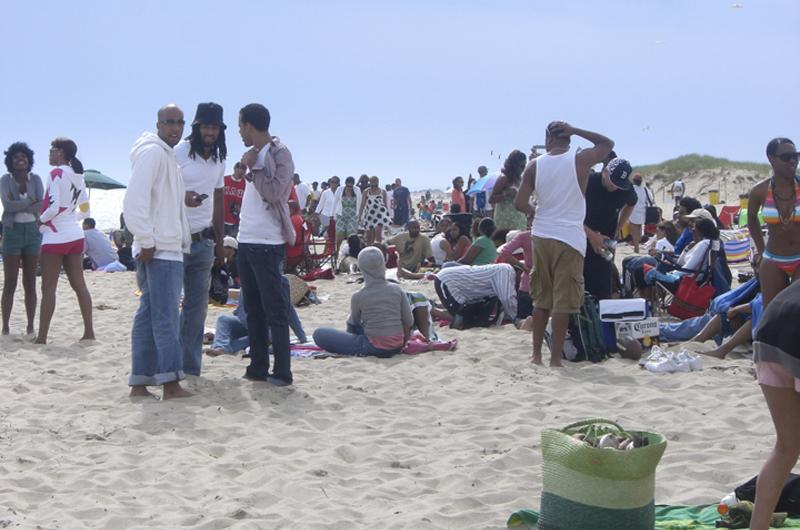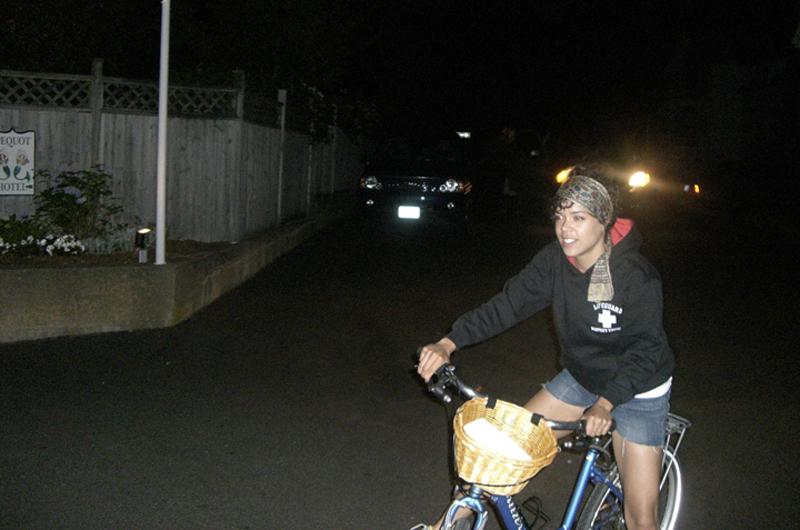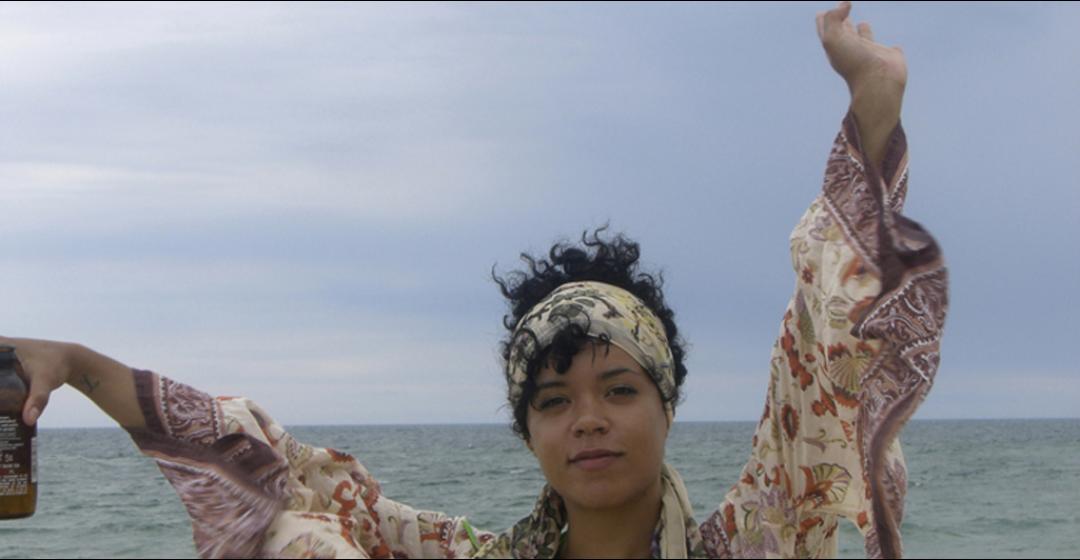Scene One: The Inkwell, 1995
I am sneaking out of the house for the first time. I am twelve years old and have been upstairs reading when a throb of beats starts to stream through the trees in front of our house. I’m not allowed to leave my house after sundown without my parents, but by 10 p.m. it’s got me; the pull of Biggie pulsing through my open window is too great to ignore.
I tiptoe out of the house, ease the always-unlocked screen door closed, mount my bike, and peddle through the thick, pitch-black night toward the music. I’m afraid; the only light is from the moon, which is sprawled out quietly on the ocean. As I get closer to the music I can make out bodies of all races, writhing by the beach. I’m transfixed. I assumed all parties were dinner parties, held by my parents and ended by my bedtime. This party is thriving, built for release. There is a DJ, a rack of “Guardian Angels” (those volunteer do-gooders) scattered about, making sure nothing much goes down, and all the open space, a clear invitation to anyone willing to join.
I dump my bike somewhere and creep down from the seawall to the old snack stand (now long gone). I clearly have no business penetrating this scene, and so I settle in to observe. I tuck myself against the bar of the snack shack and watch people relax into abandon and rave, heads down and cups up.
If someone noticed me sitting there on the sidelines, my trance was too fixed for my memory to log it. But therein set off my never-ending love for this net of relaxed luxury, exclusive to the Island. It was my first dance with this subtle opulence, where people are allowed to unleash and just be.
Over time that feeling – that vibe – has slowly been replaced with a counterfeit version of freedom.

Scene Two: The White Party, 2013
(If you’re unclear about what a “white party” is, it’s quite simple: everyone has to wear white. It’s nonsensical. Don’t attempt to apply reason.)
After seeing countless fliers around town for “the hottest place to be,” I logically decide to attend. I gather my girl and we bike over. We’re clearly not dressed in white because that rule is ridiculous (I have a summer uniform that I rarely abandon: denim cutoffs topped with a tank, the only variable being the swimsuit beneath and paired with sand-filled Sperrys) and we show up one shot of whisky in, ready to dance.
We join a choke of people being refused at the door because – surprise! – this party also has a guest list. (Note to would-be entertainers: if you mass-market a party, exclusivity at the door is absolutely counterproductive and a real, shall we say, off-Island move.) Still marginally undeterred and duly aware that we aren’t on the list, we decide to employ a few old tricks that we oiled as teen girls: my friend scans the guest list and we pretend to be other people. It works. (Further note: if you are rejecting the good folks who didn’t make the list, you should definitely do some facial recognition pre-checks to avoid this very issue.)
But anyway, we are welcomed into the party and immediately encounter a throng of white clad, sleepy-eyed, kinda-drunk people standing in clumps, not dancing, presumably to avoid wilting their freshly ironed whites and/or sweating out all that newly pressed hair. (Ah, man. The mistakes newcomers make. Your outfit doesn’t stand a chance on a humid Vineyard night and neither does your hair.)
We wedge through the stagnant crowd hoping to find the dance floor, but run into some friends instead. Knowing that they too were not on the list, we ask what their choice of entry was. “We snuck in through the kitchen with the owner,” they say. Brilliant thinking. Together we stand around for another half hour or so (during which my friend eats a weed-filled brownie and I have two shots of Jameson) and we eventually agree that this party is an utter wash, even when seen through the intoxicated haze of whisky and weed, and we head off to the beach, as usual.
Now, I know. We hustled into this party, our friends snuck in through the kitchen, and we’re all old enough to know that “a party is what you make it.” So if you’re thinking we were being judgmental partygoers, you’re correct – but not for the reason you might be thinking. We begrudged it because, as longtime summer residents, we knew this party was missing the typical warmness. The open-armed, come-as-you-are, dance-til-you-drop vibe that the Vineyard is known for. Guest lists? Please.
See, I like change. I think transformation is both inevitable and interesting, but there’s something about this newer Island that is emerging that seems to be headed toward a renovation of the worst kind: commercial. Bringing all-glossy-everything to our sleepy beach town is disrupting the tranquility, not to mention tugging along the people drawn to manufactured luxury, folks more interested in posturing and class than community and family. And you know they’ll come – in droves.

Don’t get me wrong. There are good things that money and fame have brought to Oak Bluffs and the rest of the Island. Growing up, I worked retail on Circuit Avenue every summer and learned at a tender age what a financial boon the summer was; my former boss often called it a “culture shock.” Over the years there has been an evolution of thoughtful attempts at capitalizing on this wealthy summer community, perhaps most notably the African-American Film Festival and the many art exhibitions. But I worry things are starting to deteriorate, and that maybe I should have seen it coming a few years back when the Washington Post called our town the new “Blackhamptons.”
We stand to lose the welcoming, cozy intimacy of the Island and replace the familiarity of local business with off-putting commercialism – and again, folks thriving off of social elevation and exclusivity.
Or do we?
Scene Three: Cottage City
You open your house for the first time, or enter one that you’re renting, and marvel at the stairs dusted with last year’s sand. Spotty cellphone coverage and only a single landline to be shared among a family of four. The forgotten rotten pipes that sputter out brown water, which you meant to fix last year. Going from the maximum exertion of detached city life to the intimate calm of the Island can be daunting. You spend a few hours wandering, phone in the palm of your hand, stretched to the sky, searching for a place to connect with the outside world, because you have to finish that one last meeting. Kids balk at the constant feeling of boredom and drag behind you, complaining that sand has somehow gotten into their new Jordans. For a second you wonder why you’re even here. What kind of hellish, sticky sanctuary is this?
But then night falls and “you can feel the relaxation in the air,” says your friend Pierre Howard, an award-winning producer and third-time visitor to the Vineyard. “Before I arrived I was hearing all these stories about how bourgeoise the Island was, that you had to own a house to feel like you belonged. But I never felt that – and don’t get me wrong, I never had a rough life, but I’m a city kid and, oh man, when I got here I was shocked! The Island is so safe, and so the people are so nice.”
He says: “I was walking back from Circuit Avenue one night and a police car drove by, so I got a little nervous. But he just drove past me, as if he didn’t even notice me. Man, that’s rare.”
So, no. We are not wives “who wear diamonds casually with bathing suits” by the shore, as the Washington Post snarkily asserted. We are not mothers with “pampered children who run through the seaweed” in the ocean. We are a community of hard workers who seek out the rare safety of the Island, often unknown in our tense, and at times unwelcoming, hometowns.
Throughout generations we have pushed the boundaries of our collective identity, perusing the authentic advancement of ideas, art, and language. To assume we travel from every major city to merely posture and further the divide among ourselves is baffling. Historically, Martha’s Vineyard has been home to a village of outliers who come to enjoy a moment of genuine equality and privacy, the last true luxury. This all stands to be lost if we slowly shape-shift to mirror the materialistic structure that drives city life. It seems to me that we’re smarter than that… at least I hope we are.





